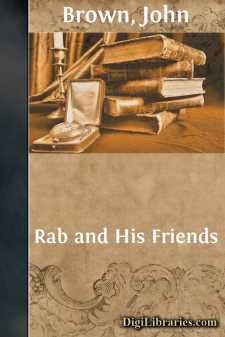Categories
- Antiques & Collectibles 13
- Architecture 36
- Art 48
- Bibles 22
- Biography & Autobiography 813
- Body, Mind & Spirit 142
- Business & Economics 28
- Children's Books 17
- Children's Fiction 14
- Computers 4
- Cooking 94
- Crafts & Hobbies 4
- Drama 346
- Education 46
- Family & Relationships 57
- Fiction 11829
- Games 19
- Gardening 17
- Health & Fitness 34
- History 1377
- House & Home 1
- Humor 147
- Juvenile Fiction 1873
- Juvenile Nonfiction 202
- Language Arts & Disciplines 88
- Law 16
- Literary Collections 686
- Literary Criticism 179
- Mathematics 13
- Medical 41
- Music 40
- Nature 179
- Non-Classifiable 1768
- Performing Arts 7
- Periodicals 1453
- Philosophy 64
- Photography 2
- Poetry 896
- Political Science 203
- Psychology 42
- Reference 154
- Religion 513
- Science 126
- Self-Help 84
- Social Science 81
- Sports & Recreation 34
- Study Aids 3
- Technology & Engineering 59
- Transportation 23
- Travel 463
- True Crime 29
Rab and His Friends
by: John Brown
Categories:
Description:
Excerpt
Four years ago, my uncle, the Rev. Dr. Smith of Biggar, asked me to give a lecture in my native village, the shrewd little capital of the Upper Ward. I never lectured before; I have no turn for it; but Avunculus was urgent, and I had an odd sort of desire to say something to these strong-brained, primitive people of my youth, who were boys and girls when I left them. I could think of nothing to give them. At last I said to myself, "I'll tell them Ailie's story." I had often told it to myself; indeed, it came on me at intervals almost painfully, as if demanding to be told, as if I heard Rab whining at the door to get in or out,—
"Whispering how meek and gentle he could be,"—
or as if James was entreating me on his death-bed to tell all the world what his Ailie was. But it was easier said than done. I tried it over and over, in vain. At last, after a happy dinner at Hanley—why are the dinners always happy at Hanley?—and a drive home alone through
"The gleam, the shadow, and the peace supreme"
of a midsummer night, I sat down about twelve and rose at four, having finished it. I slunk off to bed, satisfied and cold. I don't think I made almost any changes in it. I read it to the Biggar folk in the school-house, very frightened, and felt I was reading it ill, and their honest faces intimated as much in their affectionate puzzled looks. I gave it on my return home to some friends, who liked the story; and the first idea was to print it, as now, with illustrations, on the principle of Rogers's joke, "that it would be dished except for the plates."
But I got afraid of the public, and paused. Meanwhile, some good friend said Rab might be thrown in among the other idle hours, and so he was; and it is a great pleasure to me to think how many new friends he got.
I was at Biggar the other day, and some of the good folks told me, with a grave smile peculiar to that region, that when Rab came to them in print he was so good that they wouldn't believe he was the same Rab I had delivered in the school-room,—a testimony to my vocal powers of impressing the multitude somewhat conclusive.
I need not add that this little story is, in all essentials, true, though, if I were Shakespeare, it might be curious to point out where Phantasy tried her hand, sometimes where least suspected.
It has been objected to it as a work of art that there is too much pain; and many have said to me, with some bitterness, "Why did you make me suffer so?" But I think of my father's answer when I told him this: "And why shouldn't they suffer? SHE suffered; it will do them good; for pity, genuine pity, is, as old Aristotle says, 'of power to purge the mind.'" And though in all works of art there should be a plus of delectation, the ultimate overcoming of evil and sorrow by good and joy,—the end of all art being pleasure,—whatsoever things are lovely first, and things that are true and of good report afterwards in their turn,—still there is a pleasure, one of the strangest and strongest in our nature, in imaginative suffering with and for others,—
"In the soothing thoughts that spring
Out of human suffering;"
for sympathy is worth nothing, is, indeed, not itself, unless it has in it somewhat of personal pain. It is the hereafter that gives to
"the touch of a vanished hand,
And the sound of a voice that is still,"
its own infinite meaning. Our hearts and our understandings follow Ailie and her "ain man" into that world where there is no pain, where no one says, "I am sick." What is all the philosophy of Cicero, the wailing of Catullus, and the gloomy playfulness of Horace's variations on "Let us eat and drink," with its terrific "for," to the simple faith of the carrier and his wife in "I am the resurrection and the Life"...?




